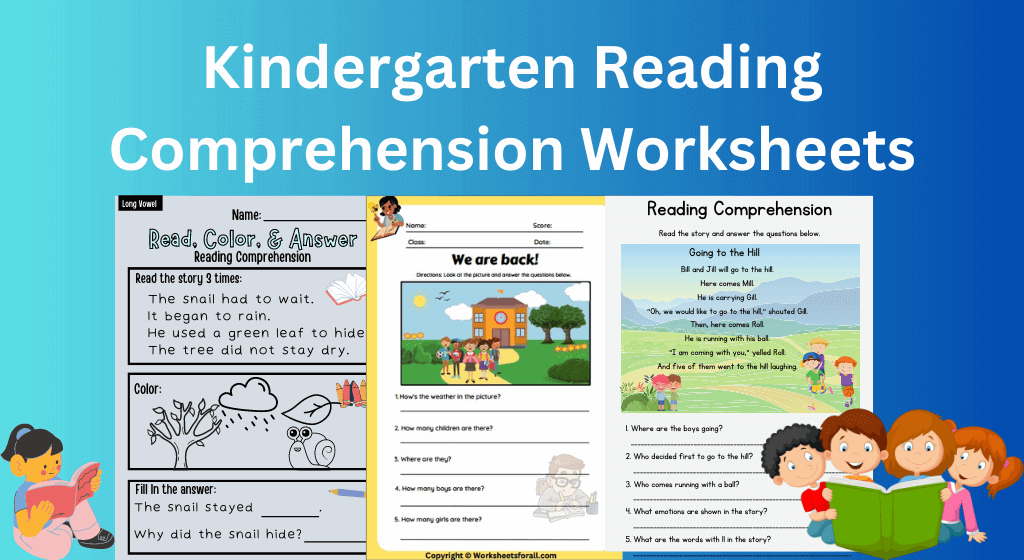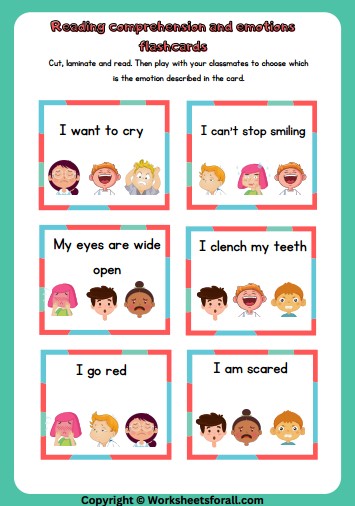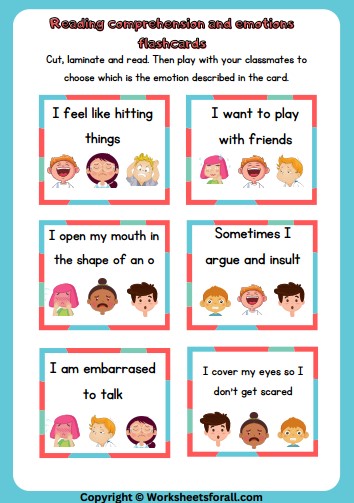Kindergarten Reading Comprehension Worksheets: Useful Way for Success
Updated: March 14, 2023
507

This article is aimed at helping readers improve their reading comprehension skills through a series of exercises and techniques. The article provides a range of kindergarten reading comprehension worksheets designed to enhance reading comprehension abilities in a practical and easy-to-follow manner. The kindergarten reading comprehension worksheets cover various topics such as identifying main ideas, making inferences, summarizing, and more.
Free Kindergarten Reading Comprehension Worksheets
Introduction: Why Reading Comprehension Is Important and How to Teach It with Kindergarten Reading Comprehension Worksheets
Understanding what you read is important for doing well in school and in everyday life. It’s something you can learn and get better at with practice. In this article, we’ll talk about why it’s important to understand what you read and how to teach this skill to kids.
When you can understand what you read, it helps you learn new things and do well in different subjects like science and social studies. It also helps you with everyday things like following directions and understanding news and media.
There are different ways to teach reading comprehension. One way is to read different things like books, magazines, and newspapers to help you learn new words and understand different ideas. Another way is to talk about what you read and ask questions to help you think more deeply about what’s going on in the story.
You can also use active reading strategies to help you understand what you’re reading better. These strategies include things like trying to guess what might happen next, summarizing what you’ve read, and thinking about how what you’re reading connects to other things you know.
In conclusion, learning to understand what you read is really important. By reading lots of different things and using active reading strategies, you can get better at this skill and do well in school and in life.
The Basics of Reading Comprehension: Understanding Key Concepts
Reading comprehension is the ability to understand and interpret written material. It involves a range of skills, including understanding vocabulary, making inferences, and understanding the main idea of a text.
One of the key concepts of kindergarten reading comprehension worksheets is to understand the main idea. This is the central message or purpose of a text. It is important for readers to be able to identify the main idea in order to understand the overall meaning of a text.
Another important concept is making inferences. This involves using clues from the text to make educated guesses about what the author is trying to convey. By making inferences, readers can deepen their understanding of a text and draw connections between different parts of the material.
Context is also a crucial element of reading comprehension. Understanding the context of a text helps readers to interpret the meaning of words and phrases that might otherwise be unfamiliar.
Additionally, it is important for readers to be able to identify important details within a text. This involves recognizing information that supports the main idea or argument and distinguishing it from less important information.
In summary, reading comprehension involves understanding key concepts such as identifying the main idea, making inferences, understanding context, and identifying important details. By mastering these concepts, readers can become more effective at comprehending written material.
Can Reading Comprehension Be Taught? Exploring Different Perspectives with Kindergarten Reading Comprehension Worksheets
There has been much debate about whether reading comprehension can be taught or whether it is simply a skill that some people possess naturally. Some educators believe that reading comprehension is an innate ability that cannot be taught, while others argue that it can be developed through specific strategies and techniques.
On one hand, those who believe that reading comprehension is a natural ability argue that individuals are either born with the capacity to understand written language or they are not. These individuals argue that while some students may struggle with reading comprehension, no amount of instruction or practice can help them improve.
On the other hand, proponents of the idea that reading comprehension can be taught believe that it is a skill that can be developed through targeted instruction and practice. This perspective holds that students can be taught to identify and apply reading strategies that will help them better understand and retain information.
Ultimately, the answer to the question of whether reading comprehension can be taught may lie somewhere in between. While some individuals may have a natural inclination towards comprehension, targeted instruction and practice can undoubtedly help improve reading skills for most people. By exploring different perspectives on this topic, educators and parents can gain a better understanding of the most effective ways to help their students and children improve their reading comprehension skills.
Effective Strategies for Teaching Reading Comprehension: Simple Techniques That Work
Teaching reading comprehension can be a challenging task, but there are effective strategies that can help. One important strategy is to make sure that children have access to reading materials that are appropriate for their reading level and interests. When children read books and other materials that they find engaging, they are more likely to stay motivated and focused.
Another strategy is to encourage children to ask questions and make predictions about what they are reading. This helps them to think more deeply about the story and develop critical thinking skills. In addition, teachers and parents can guide children through the reading process by asking them to summarize what they have read, make connections to their own experiences, and visualize what is happening in the story.
It is also important to create a positive and supportive reading environment. Children should be given opportunities to read in a quiet and comfortable space and should be praised for their efforts and progress. This helps to build confidence and a love of reading, which is essential for long-term success.
In conclusion, kindergarten reading comprehension worksheets requires a variety of effective strategies. By providing access to engaging reading materials, encouraging questioning and prediction-making, and creating a positive reading environment, children can develop the skills they need to understand what they read and succeed in school and beyond.
Using Fun Worksheets to Improve Reading Comprehension: Practical Exercises for Preschoolers and Homeschoolers
One effective way to improve reading comprehension in preschoolers and homeschoolers is through the use of fun worksheets. These worksheets can help engage children in the learning process and make reading comprehension practice more enjoyable.
There are many types of reading comprehension worksheets available for preschoolers and homeschoolers, including story sequencing, reading comprehension passages, and matching exercises. Story sequencing worksheets help children develop their ability to understand the order of events in a story. Reading comprehension passages provide children with the opportunity to practice reading and understanding longer texts. Matching exercises can help improve children’s ability to identify and match words with their definitions.
When choosing reading comprehension worksheets for preschoolers and homeschoolers, it’s important to select worksheets that are age-appropriate and aligned with their current reading level. Additionally, it’s important to ensure that the worksheets are engaging and fun, as this will help children stay motivated and interested in the learning process.
By incorporating fun kindergarten reading comprehension worksheets into a preschooler or homeschooler’s learning routine, parents and educators can help children develop strong reading skills that will serve them well throughout their academic careers.
Conclusion: Empowering Your Child to Succeed in Reading
In conclusion, reading comprehension is an essential skill that can be developed and strengthened through the use of effective strategies and techniques. By introducing children to fun and engaging worksheets, parents and teachers can foster a love for reading and improve their ability to comprehend text. It is also important to recognize that different perspectives exist on whether reading comprehension can be taught or not. However, by creating a supportive environment and providing children with the necessary tools, we can empower them to succeed in their reading journey.
In order to help children improve their reading comprehension, it is important to focus on key concepts such as identifying main ideas, making connections, and using context clues. By using practical exercises and fun worksheets, parents and teachers can help children develop these skills and become confident readers. With persistence and dedication, children can achieve success in reading comprehension and open up a world of possibilities in their education and beyond.



Please Write Your Comments